- Home
- Michael Thomas Ford
Full Circle Page 15
Full Circle Read online
Page 15
How is it that the sight of a small shepherd boy stumbling over the belt of his father's bathrobe on the way to stand beside a doll lying in a box of straw can bring one to the point of tears? It does now, and it did then. I remember that night watching the children assemble, the angels holding their tinsel halos to prevent them from falling off, poor Joseph peering anxiously at a somber Mary, as if terrified she might at any moment yell at him to stop fidgeting. As I looked at them, I saw Jack and myself at their age. Like them, we'd never worried about being sent to war. We'd never imagined that the games of soldier that we waged in backyards and school playgrounds would one day be undertaken in foreign jungles with real weapons. Their innocence, and the loss of ours, was heartbreaking. Together we sang "All My Heart this Night Rejoices," a hymn I have only ever heard sung in that church. "All my heart this night rejoices," goes the first line with its peculiar up-and-down meter, followed by the staccato second, "As I hear, far and near, sweetest angel voices." The cycle is then repeated, and the Nativity story advanced, with "Christ is born, their choirs are singing. Till the air, everywhere, now with joy is ringing."
Like so many of the songs written by Paul Gerhardt, the Lutheran church's prolific and beloved hymnist, this one has many verses. Fifteen, to be exact. With true Lutheran doggedness, we sang every one of them while the children held their poses as best they could, the wise men frozen on their knees before the baby Jesus and the shepherds restlessly swaying from side to side, ready for the cookies and cider awaiting them in the church's basement.
Nearly forty years later, I still recall the words to that hymn, although I will admit that I did require some assistance. Several years ago, wanting to share the song with Thayer, I sought out a Lutheran hymnal to refresh my memory. (Thayer would say that I stole it from a church in town while pretending to admire the architecture, but I argue that my need was pure and God forgiving.) At any rate, I did remember its place in the hymnal, number 77, and was pleased to see that my recall was only somewhat lacking. Admittedly tedious in its repetitiveness, the song is nonetheless blessed with some lovely imagery. My favorite of the verses is number eight: "Come, then, banish all your sadness, one and all, great and small, come with songs of gladness. Love Him who with love is glowing, hail the Star, near and far, light and joy bestowing."
The message, unfortunately, was lost on my 19-year-old self. I sang the words without hearing, and certainly not feeling, any of the gladness contained in them. Although I wanted to be happy, I wouldn't allow myself to be. I was too sad, and too angry. I was angry at Jack for allowing himself to fall so far behind in his schoolwork. I was angry at myself for refusing to help him and then taking pleasure in his failure. I was even angry at the baby Jesus for daring to offer his gift of salvation while so many were dying or preparing to die, and at the angels for proclaiming his goodness. My Christmas wish, had I been asked, would have been to switch places with Jack so that I, not he, would be facing the possibility of going to Vietnam.
We did not join the congregation for cookies following the service, instead returning home for a supper of oyster stew, a tradition which originated within my mother's family. In 1879, her grandmother had brought with her from Dublin a recipe for fish soup, long served in Ireland on Christmas Eve. Finding ling cod, the primary ingredient, unavailable, the resourceful woman (and many of her Southside Chicago neighbors) had substituted oysters, considered a poor man's food in 18th century America and therefore plentiful and cheap. She had taught my mother to make it when she was a girl, and she still did it the same way Brigid O'Reilly had a century before, tumbling the oysters into a pan of warm cream and melted butter and heating them until the fluted sides curled up indignantly. Served hot in a bowl with tiny crackers, it was a perfect precursor to the more substantial Christmas feast we would have the next day. Christmas Eve was one of the few days we did not share with Jack's family. In almost all other ways identical to us, on the point of religion they had declared their independence. While we went to Ebenezer Lutheran, they went across town to the Emanuel United Methodist Church. In recent years, they had also begun to go with much more regularity, to the point where Mr. Grace was now a deacon and Jack's mother occasionally found herself having to host lunches for the Ladies' Auxiliary. They also opened their presents on Christmas Eve, while our family waited until the morning. As children, this had presented Jack and I with an unusual dilemma. While he went to bed with his gifts revealed and often in his arms or within easy reach, I was forced to spend an anxious night wondering what Santa would leave for me. Both of us would have to wait until I was finished tearing the paper from the boxes beneath the tree the next morning before we could compare our bounty over our shared Christmas dinner. Our parents explained the difference in Mr. Claus' schedules for visiting our homes by telling us that our houses, though side by side, were on different delivery routes, a lie we accepted rather than accept the awful truth.
One of the great disappointments of adulthood is the diminished thrill one receives from the sight of a wrapped present, whether it's handed over directly or discovered beneath an ornament-laden tree. Not that the getting of gifts can't be a joy. I have certainly in my life been the recipient of many a fine and excellent present. But after about the age of 12 or 13, I think the fear of disappointment gradually wears away at the experience. There are expectations on both sides—on yours that the contents of the box will be what you are hoping for, and on the other that you will be pleased—and this places undue strain on everyone involved. Should the present in fact be of dubious merit, the energy required to reassure the giver that it is precisely what the occasion called for makes for a very long day. At 19, I had already experienced this sea change. Until about my tenth year, my presents had generally been of the kind that are anticipated by boys: model airplanes, the occasional book, a bicycle. As adolescence dawned, these had been replaced, at first slowly and then in a steady stream, by more practical items, chiefly clothes of which I was deeply embarrassed. I had eventually accepted that this was to be my fate, and since then had spent Christmas mornings opening in tandem with my father boxes of underpants, socks, and sweaters.
After the oyster stew, consumed in relative silence by myself and my parents, I said good night and retired to my room. Lying in the darkness, I tried to remember what it had felt like to be excited on Christmas Eve. I could recall praying for sleep to come, restlessly tossing and turning as I tried to will my rushing thoughts to still. Every thump was the hoof of one of Santa's reindeer alighting on the roof, every scritch and scratch the sound of his girth scraping the chimney bricks as he descended to our living room. In my head, I would run through the list of items I had requested in the annual letter posted to the North Pole, and worry that perhaps, this year, I had not made it onto the "Nice" list. Hours seemed to pass as I struggled against wakefulness, until finally I woke up and discovered that I had slept and that it was time to go downstairs.
Although long past the days when the notion of Santa and his sack of toys had kept me up, that night I once again found it impossible to relax. My thoughts swirled, mimicking the snow outside my window, which had begun to fall in mid-afternoon and showed every intention of becoming a blizzard by morning. Also like the snow, they chilled me deeply, freezing my heart in my chest and making me long for any warmth, any spark of hope, that would ease the suffering.
I imagined Jack in his own bed, just across the yard from mine. Was he, like me, lying there thinking about the mess we'd made of our future, and of our friendship? Did he, as I did, regret anything that had happened, anything that had been said? Unable to sleep, I got up and went to my window. Through the snow, I saw the lighted square of Jack's window. For a moment I thought he was standing there looking back at me, and my heart skipped. Then the figure moved, and I saw that he was simply walking around the room, getting ready for sleep.
As boys, we had once tied two empty Green Giant Peas cans to a length of string and stretched it between our windows to make a telephone. Although the
words spoken into the can on one end were certainly not audible on the other, reduced by the distance to the barest of vibrations, we pretended they were, and used the primitive device to exchange secret messages late at night. I wondered if Jack remembered that, or if he had forgotten it along with other things for which he no longer had any use. If I could pick up the can and talk to him, I asked myself, what would I say? I'd said I was sorry, but was it even possible to be sorry enough for what I'd done? Was it possible that we could mend the rift that grew wider with every passing day? I still loved him. That much I knew to be true. But had that love changed so much, been altered so drastically by both our actions, that it had become something else, something impossible to return to its original state?
Standing there, watching Jack's shadow through the scrim of snow, I thought perhaps hope wasn't entirely dead. I thought of the words of the hymn I'd sung only a few hours before. "Love him who with love is glowing," I whispered in the darkness, looking at the light from Jack's bedroom. Its warmth shined through the winter cold. Maybe it wasn't too late, I thought. Maybe, despite everything, we could go back. Andy, school, the war—perhaps none of it had damaged us beyond repair. I returned to my bed happier than I'd been in weeks. Tomorrow, I thought, I would talk to Jack and see if we couldn't start again. I would offer to help him with his grades. I would demand that we remain roommates. I would even, if he asked me, agree to give up Andy if that would allow us to be what we had been for so long. I could do that for him. I could do it because I loved him, had always loved him. As I had years before, I waited for sleep to overtake me. Morning seemed impossibly far, and I too anxious for its arrival. I turned one way and then another, but my mind kept rehearsing the words I would say to Jack when I saw him. Over and over I spoke them to myself, searching for the perfect arrangement that would make him see how determined I was to make everything right.
CHAPTER 19
When I woke up, it was with the thought that it must still be the middle of the night. I was delighted to see that I was mistaken, and that the pale light of morning was in fact visible outside. Happily, I got up, pulled on my clothes, and went downstairs, ready to embrace what I hoped would be a day of reconciliation and renewal. My mother, always up early on Christmas morning, was busily setting out breakfast. My father was adding a log to the fireplace, poking at the embers and watching them intently, as if in their glow he could read the secrets of life.
"Ned," my mother said, coming to give me a kiss. "Merry Christmas."
"Merry Christmas," I said.
"Are you ready for your big surprise?" she asked.
I'd forgotten all about the gift about which she'd been dropping hints since my arrival. I had been buried under the avalanche of worry, unable to think of anything that might threaten my sorry state. Now, having dug myself out and into the fresh air, I found that I was excited. Feeling 10 years old again, I said, "You bet. Where is it?"
My father put his hand on my shoulder and turned me around, away from the Christmas tree. Marching me to the front door, he opened it. "Take a look," he said. I stepped onto the porch. There, in front of the house, was a 1970 Ford Mustang. An enormous red bow sat on top, matching the car's red paint job. I stared at it for a full minute, wondering where my surprise was, before I realized that the car was the surprise. I couldn't believe it. I turned to my father, unable to speak.
"Vietnam has been hell on the economy, but it's been great for the insurance business," he said. "Merry Christmas, kid." I couldn't wait to show the car to Jack. I knew he'd be even more excited about it than I was, and letting him drive it would be the first step on the road to mending our relationship. Maybe, I thought, I could even get him to drive to our favorite make-out spot. I hurried through the rest of the morning, anxious for him and his parents to arrive for dinner.
They came just before noon, Mr. Grace and Jack carrying armfuls of gifts that they'd saved for the traditional after-dinner swap and Mrs. Grace carrying a casserole dish I knew contained green beans mixed with cream of mushroom soup and French-fried onions. I welcomed them in and took some of the presents from Jack, who gestured his thumb toward the door and said, "Whose Mustang?"
"Mine," I answered, beaming.
Jack's eyes opened wide. "Yours?" he said.
I nodded. "Want to go for a ride in it?" I added, holding up the keys. A minute later, after promising to be back in half an hour, Jack was sitting in the driver's seat of the car, running his hands over the steering wheel. "This is one hot piece of shit," he said. In the passenger seat, I leaned back and let the happiness wash over me. Jack seemed his old self at last, full of excitement and the boyish wonder I'd always found so attractive. As he started the engine and laughed at the roar, I almost leaned over and kissed him. But that could wait, I told myself. I had some things to say to him first.
Because of the snow, he drove slowly, although Jack's slow was still faster than most people's idea of pushing the limits. The car handled beautifully, and when Jack finally stopped, in the almost-empty parking lot of a diner whose windows twinkled brightly and where a hand-lettered sign read SPEND X MAS WITH US!, he shook his head appreciatively.
"You scored with this baby," he said.
I nodded. Suddenly, I was nervous, as if we were on a first date. I wanted to say so many things, but I couldn't remember a word of what I'd rehearsed the night before. "I have something to…" Jack and I said simultaneously.
We both stopped, each waiting for the other to speak. I nodded at Jack. "Go ahead," I said. "I've, um, been thinking a lot," he said. "You know, about stuff."
My heart raced, waiting for him to give me the lead-in I'd been looking for. I almost interrupted him, so anxious was I to get what I was feeling out into the open.
Jack looked out the window, seeming to scan the parking lot for an eternity before turning back. "I'm not going," he said. Not going? I didn't understand. Then it dawned on me—he wasn't going to Vietnam. He'd decided to find a way out. This time I did lean over and kiss him. But it was awkward, his mouth hard and unyielding. When I pulled away, confused, he was staring at me with a puzzled expression.
"Why'd you do that?" he asked.
"You said you're not going," I answered. "You're staying."
He nodded. "Yeah," he said hesitantly. "So why are you all happy about it?"
"You're staying ," I said. "In school. With me. You're not going to Vietnam."
Jack slumped in his seat, shaking his head.
"What?" I asked.
He looked at me and sighed deeply. "I'm not going back to Penn," he said. "I'm staying here." "But you'll be drafted," I said, as if this would be news to him.
"There are other kinds of deferments," said Jack. "I'll get one."
"For what?" I asked. "What are you going to do, tell them you're queer? Shoot yourself in the foot? What?" Jack looked down. "I'm going to seminary," he said.
He might as well have slapped me across the face. I couldn't believe I'd heard him correctly. "Seminary?" I repeated.
"Wesley Theological," he answered. "In Washington. My dad knows some people there through church, and…"
"Jack, you've been to church what, maybe twenty times in your life? And now you want to be a minister?" I laughed harshly.
"It's my way out," he snapped. "There's no way I can make it at Penn. This is a chance for me. My dad had to pull in a lot of favors to get me in there. I don't have a choice."
"You always have a choice," I shot back. "No," said Jack. "You always have a choice, Ned. I don't. I have two, just two. I can get drafted and probably end up dead or lying in some piss hole with my legs blown off, or I can stay here and do this. Don't tell me I have a choice when all you have to worry about is writing some stupid fucking papers and reading a bunch of books!"
He was shouting. I put my hands over my ears to drown him out. I didn't want to hear it. I just wanted him to be quiet so that I could figure out what to do, figure out where I'd gone wrong and fix everything. A minute before I'd b
een at the top of the mountain; now I was slipping down the side, unable to grab hold and heading for the rocks at the bottom.
Jack stopped yelling. I took my hands from my ears and sat with them in my lap. I couldn't look at Jack, so I looked at my gloves, trying to count the stitches in the leather. I couldn't think about the fact that Jack, my Jack, was going to Methodist seminary while I went back to Penn State. "I just wanted you to know," he said. "I guess it's a good thing you got a car, huh? Now you don't have to take the bus back." I wiped my nose on my sleeve and asked, "Do you believe in God?"
"What?" Jack asked.
"God," I repeated. "Do you even believe in God?"
Jack shrugged. "Sure," he said. "Doesn't everyone?"
"The Communists don't, if you believe Nixon," I said. "Isn't that why we have to make sure they don't take over Vietnam?"
"I don't know," Jack mumbled, clearly confused by the turn the conversation had taken. "It doesn't matter," I said. "I was just curious. You know, since you're going to be a minister now." "Oh," said Jack. "Well, yeah, I guess I believe in God then."
"Good," I said. "That should help. Maybe you can convince me that he exists one of these days."
Jack looked at his watch. "We should be getting back," he said. "Your mom said half an hour. You want to drive?"
I shook my head. "You go ahead," I told him. "I'll get a lot of practice when I drive back next week." We returned to my house. While we were gone, the Graces had filled my parents in on Jack's new career path. My mother congratulated him, while my father gave him what seemed a halfhearted handshake and wished him luck. Then we all sat down to dinner, which passed interminably as Mrs. Grace said every two or three minutes how pleased Reverend Plowman at their church was that Jack was showing an interest in the faith. Her voice, while light, also sounded a little strained, as if it was herself she was trying to convince, rather than the rest of us. Mr. Grace sat silently by, cutting his turkey into tiny bites and eating them one at a time.
Like so many of the songs written by Paul Gerhardt, the Lutheran church's prolific and beloved hymnist, this one has many verses. Fifteen, to be exact. With true Lutheran doggedness, we sang every one of them while the children held their poses as best they could, the wise men frozen on their knees before the baby Jesus and the shepherds restlessly swaying from side to side, ready for the cookies and cider awaiting them in the church's basement.
Nearly forty years later, I still recall the words to that hymn, although I will admit that I did require some assistance. Several years ago, wanting to share the song with Thayer, I sought out a Lutheran hymnal to refresh my memory. (Thayer would say that I stole it from a church in town while pretending to admire the architecture, but I argue that my need was pure and God forgiving.) At any rate, I did remember its place in the hymnal, number 77, and was pleased to see that my recall was only somewhat lacking. Admittedly tedious in its repetitiveness, the song is nonetheless blessed with some lovely imagery. My favorite of the verses is number eight: "Come, then, banish all your sadness, one and all, great and small, come with songs of gladness. Love Him who with love is glowing, hail the Star, near and far, light and joy bestowing."
The message, unfortunately, was lost on my 19-year-old self. I sang the words without hearing, and certainly not feeling, any of the gladness contained in them. Although I wanted to be happy, I wouldn't allow myself to be. I was too sad, and too angry. I was angry at Jack for allowing himself to fall so far behind in his schoolwork. I was angry at myself for refusing to help him and then taking pleasure in his failure. I was even angry at the baby Jesus for daring to offer his gift of salvation while so many were dying or preparing to die, and at the angels for proclaiming his goodness. My Christmas wish, had I been asked, would have been to switch places with Jack so that I, not he, would be facing the possibility of going to Vietnam.
We did not join the congregation for cookies following the service, instead returning home for a supper of oyster stew, a tradition which originated within my mother's family. In 1879, her grandmother had brought with her from Dublin a recipe for fish soup, long served in Ireland on Christmas Eve. Finding ling cod, the primary ingredient, unavailable, the resourceful woman (and many of her Southside Chicago neighbors) had substituted oysters, considered a poor man's food in 18th century America and therefore plentiful and cheap. She had taught my mother to make it when she was a girl, and she still did it the same way Brigid O'Reilly had a century before, tumbling the oysters into a pan of warm cream and melted butter and heating them until the fluted sides curled up indignantly. Served hot in a bowl with tiny crackers, it was a perfect precursor to the more substantial Christmas feast we would have the next day. Christmas Eve was one of the few days we did not share with Jack's family. In almost all other ways identical to us, on the point of religion they had declared their independence. While we went to Ebenezer Lutheran, they went across town to the Emanuel United Methodist Church. In recent years, they had also begun to go with much more regularity, to the point where Mr. Grace was now a deacon and Jack's mother occasionally found herself having to host lunches for the Ladies' Auxiliary. They also opened their presents on Christmas Eve, while our family waited until the morning. As children, this had presented Jack and I with an unusual dilemma. While he went to bed with his gifts revealed and often in his arms or within easy reach, I was forced to spend an anxious night wondering what Santa would leave for me. Both of us would have to wait until I was finished tearing the paper from the boxes beneath the tree the next morning before we could compare our bounty over our shared Christmas dinner. Our parents explained the difference in Mr. Claus' schedules for visiting our homes by telling us that our houses, though side by side, were on different delivery routes, a lie we accepted rather than accept the awful truth.
One of the great disappointments of adulthood is the diminished thrill one receives from the sight of a wrapped present, whether it's handed over directly or discovered beneath an ornament-laden tree. Not that the getting of gifts can't be a joy. I have certainly in my life been the recipient of many a fine and excellent present. But after about the age of 12 or 13, I think the fear of disappointment gradually wears away at the experience. There are expectations on both sides—on yours that the contents of the box will be what you are hoping for, and on the other that you will be pleased—and this places undue strain on everyone involved. Should the present in fact be of dubious merit, the energy required to reassure the giver that it is precisely what the occasion called for makes for a very long day. At 19, I had already experienced this sea change. Until about my tenth year, my presents had generally been of the kind that are anticipated by boys: model airplanes, the occasional book, a bicycle. As adolescence dawned, these had been replaced, at first slowly and then in a steady stream, by more practical items, chiefly clothes of which I was deeply embarrassed. I had eventually accepted that this was to be my fate, and since then had spent Christmas mornings opening in tandem with my father boxes of underpants, socks, and sweaters.
After the oyster stew, consumed in relative silence by myself and my parents, I said good night and retired to my room. Lying in the darkness, I tried to remember what it had felt like to be excited on Christmas Eve. I could recall praying for sleep to come, restlessly tossing and turning as I tried to will my rushing thoughts to still. Every thump was the hoof of one of Santa's reindeer alighting on the roof, every scritch and scratch the sound of his girth scraping the chimney bricks as he descended to our living room. In my head, I would run through the list of items I had requested in the annual letter posted to the North Pole, and worry that perhaps, this year, I had not made it onto the "Nice" list. Hours seemed to pass as I struggled against wakefulness, until finally I woke up and discovered that I had slept and that it was time to go downstairs.
Although long past the days when the notion of Santa and his sack of toys had kept me up, that night I once again found it impossible to relax. My thoughts swirled, mimicking the snow outside my window, which had begun to fall in mid-afternoon and showed every intention of becoming a blizzard by morning. Also like the snow, they chilled me deeply, freezing my heart in my chest and making me long for any warmth, any spark of hope, that would ease the suffering.
I imagined Jack in his own bed, just across the yard from mine. Was he, like me, lying there thinking about the mess we'd made of our future, and of our friendship? Did he, as I did, regret anything that had happened, anything that had been said? Unable to sleep, I got up and went to my window. Through the snow, I saw the lighted square of Jack's window. For a moment I thought he was standing there looking back at me, and my heart skipped. Then the figure moved, and I saw that he was simply walking around the room, getting ready for sleep.
As boys, we had once tied two empty Green Giant Peas cans to a length of string and stretched it between our windows to make a telephone. Although the
words spoken into the can on one end were certainly not audible on the other, reduced by the distance to the barest of vibrations, we pretended they were, and used the primitive device to exchange secret messages late at night. I wondered if Jack remembered that, or if he had forgotten it along with other things for which he no longer had any use. If I could pick up the can and talk to him, I asked myself, what would I say? I'd said I was sorry, but was it even possible to be sorry enough for what I'd done? Was it possible that we could mend the rift that grew wider with every passing day? I still loved him. That much I knew to be true. But had that love changed so much, been altered so drastically by both our actions, that it had become something else, something impossible to return to its original state?
Standing there, watching Jack's shadow through the scrim of snow, I thought perhaps hope wasn't entirely dead. I thought of the words of the hymn I'd sung only a few hours before. "Love him who with love is glowing," I whispered in the darkness, looking at the light from Jack's bedroom. Its warmth shined through the winter cold. Maybe it wasn't too late, I thought. Maybe, despite everything, we could go back. Andy, school, the war—perhaps none of it had damaged us beyond repair. I returned to my bed happier than I'd been in weeks. Tomorrow, I thought, I would talk to Jack and see if we couldn't start again. I would offer to help him with his grades. I would demand that we remain roommates. I would even, if he asked me, agree to give up Andy if that would allow us to be what we had been for so long. I could do that for him. I could do it because I loved him, had always loved him. As I had years before, I waited for sleep to overtake me. Morning seemed impossibly far, and I too anxious for its arrival. I turned one way and then another, but my mind kept rehearsing the words I would say to Jack when I saw him. Over and over I spoke them to myself, searching for the perfect arrangement that would make him see how determined I was to make everything right.
CHAPTER 19
When I woke up, it was with the thought that it must still be the middle of the night. I was delighted to see that I was mistaken, and that the pale light of morning was in fact visible outside. Happily, I got up, pulled on my clothes, and went downstairs, ready to embrace what I hoped would be a day of reconciliation and renewal. My mother, always up early on Christmas morning, was busily setting out breakfast. My father was adding a log to the fireplace, poking at the embers and watching them intently, as if in their glow he could read the secrets of life.
"Ned," my mother said, coming to give me a kiss. "Merry Christmas."
"Merry Christmas," I said.
"Are you ready for your big surprise?" she asked.
I'd forgotten all about the gift about which she'd been dropping hints since my arrival. I had been buried under the avalanche of worry, unable to think of anything that might threaten my sorry state. Now, having dug myself out and into the fresh air, I found that I was excited. Feeling 10 years old again, I said, "You bet. Where is it?"
My father put his hand on my shoulder and turned me around, away from the Christmas tree. Marching me to the front door, he opened it. "Take a look," he said. I stepped onto the porch. There, in front of the house, was a 1970 Ford Mustang. An enormous red bow sat on top, matching the car's red paint job. I stared at it for a full minute, wondering where my surprise was, before I realized that the car was the surprise. I couldn't believe it. I turned to my father, unable to speak.
"Vietnam has been hell on the economy, but it's been great for the insurance business," he said. "Merry Christmas, kid." I couldn't wait to show the car to Jack. I knew he'd be even more excited about it than I was, and letting him drive it would be the first step on the road to mending our relationship. Maybe, I thought, I could even get him to drive to our favorite make-out spot. I hurried through the rest of the morning, anxious for him and his parents to arrive for dinner.
They came just before noon, Mr. Grace and Jack carrying armfuls of gifts that they'd saved for the traditional after-dinner swap and Mrs. Grace carrying a casserole dish I knew contained green beans mixed with cream of mushroom soup and French-fried onions. I welcomed them in and took some of the presents from Jack, who gestured his thumb toward the door and said, "Whose Mustang?"
"Mine," I answered, beaming.
Jack's eyes opened wide. "Yours?" he said.
I nodded. "Want to go for a ride in it?" I added, holding up the keys. A minute later, after promising to be back in half an hour, Jack was sitting in the driver's seat of the car, running his hands over the steering wheel. "This is one hot piece of shit," he said. In the passenger seat, I leaned back and let the happiness wash over me. Jack seemed his old self at last, full of excitement and the boyish wonder I'd always found so attractive. As he started the engine and laughed at the roar, I almost leaned over and kissed him. But that could wait, I told myself. I had some things to say to him first.
Because of the snow, he drove slowly, although Jack's slow was still faster than most people's idea of pushing the limits. The car handled beautifully, and when Jack finally stopped, in the almost-empty parking lot of a diner whose windows twinkled brightly and where a hand-lettered sign read SPEND X MAS WITH US!, he shook his head appreciatively.
"You scored with this baby," he said.
I nodded. Suddenly, I was nervous, as if we were on a first date. I wanted to say so many things, but I couldn't remember a word of what I'd rehearsed the night before. "I have something to…" Jack and I said simultaneously.
We both stopped, each waiting for the other to speak. I nodded at Jack. "Go ahead," I said. "I've, um, been thinking a lot," he said. "You know, about stuff."
My heart raced, waiting for him to give me the lead-in I'd been looking for. I almost interrupted him, so anxious was I to get what I was feeling out into the open.
Jack looked out the window, seeming to scan the parking lot for an eternity before turning back. "I'm not going," he said. Not going? I didn't understand. Then it dawned on me—he wasn't going to Vietnam. He'd decided to find a way out. This time I did lean over and kiss him. But it was awkward, his mouth hard and unyielding. When I pulled away, confused, he was staring at me with a puzzled expression.
"Why'd you do that?" he asked.
"You said you're not going," I answered. "You're staying."
He nodded. "Yeah," he said hesitantly. "So why are you all happy about it?"
"You're staying ," I said. "In school. With me. You're not going to Vietnam."
Jack slumped in his seat, shaking his head.
"What?" I asked.
He looked at me and sighed deeply. "I'm not going back to Penn," he said. "I'm staying here." "But you'll be drafted," I said, as if this would be news to him.
"There are other kinds of deferments," said Jack. "I'll get one."
"For what?" I asked. "What are you going to do, tell them you're queer? Shoot yourself in the foot? What?" Jack looked down. "I'm going to seminary," he said.
He might as well have slapped me across the face. I couldn't believe I'd heard him correctly. "Seminary?" I repeated.
"Wesley Theological," he answered. "In Washington. My dad knows some people there through church, and…"
"Jack, you've been to church what, maybe twenty times in your life? And now you want to be a minister?" I laughed harshly.
"It's my way out," he snapped. "There's no way I can make it at Penn. This is a chance for me. My dad had to pull in a lot of favors to get me in there. I don't have a choice."
"You always have a choice," I shot back. "No," said Jack. "You always have a choice, Ned. I don't. I have two, just two. I can get drafted and probably end up dead or lying in some piss hole with my legs blown off, or I can stay here and do this. Don't tell me I have a choice when all you have to worry about is writing some stupid fucking papers and reading a bunch of books!"
He was shouting. I put my hands over my ears to drown him out. I didn't want to hear it. I just wanted him to be quiet so that I could figure out what to do, figure out where I'd gone wrong and fix everything. A minute before I'd b
een at the top of the mountain; now I was slipping down the side, unable to grab hold and heading for the rocks at the bottom.
Jack stopped yelling. I took my hands from my ears and sat with them in my lap. I couldn't look at Jack, so I looked at my gloves, trying to count the stitches in the leather. I couldn't think about the fact that Jack, my Jack, was going to Methodist seminary while I went back to Penn State. "I just wanted you to know," he said. "I guess it's a good thing you got a car, huh? Now you don't have to take the bus back." I wiped my nose on my sleeve and asked, "Do you believe in God?"
"What?" Jack asked.
"God," I repeated. "Do you even believe in God?"
Jack shrugged. "Sure," he said. "Doesn't everyone?"
"The Communists don't, if you believe Nixon," I said. "Isn't that why we have to make sure they don't take over Vietnam?"
"I don't know," Jack mumbled, clearly confused by the turn the conversation had taken. "It doesn't matter," I said. "I was just curious. You know, since you're going to be a minister now." "Oh," said Jack. "Well, yeah, I guess I believe in God then."
"Good," I said. "That should help. Maybe you can convince me that he exists one of these days."
Jack looked at his watch. "We should be getting back," he said. "Your mom said half an hour. You want to drive?"
I shook my head. "You go ahead," I told him. "I'll get a lot of practice when I drive back next week." We returned to my house. While we were gone, the Graces had filled my parents in on Jack's new career path. My mother congratulated him, while my father gave him what seemed a halfhearted handshake and wished him luck. Then we all sat down to dinner, which passed interminably as Mrs. Grace said every two or three minutes how pleased Reverend Plowman at their church was that Jack was showing an interest in the faith. Her voice, while light, also sounded a little strained, as if it was herself she was trying to convince, rather than the rest of us. Mr. Grace sat silently by, cutting his turkey into tiny bites and eating them one at a time.

 Jane Bites Back
Jane Bites Back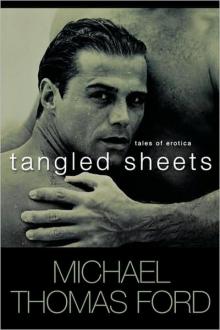 Tangled Sheets
Tangled Sheets Z
Z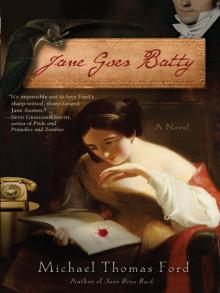 Jane Goes Batty
Jane Goes Batty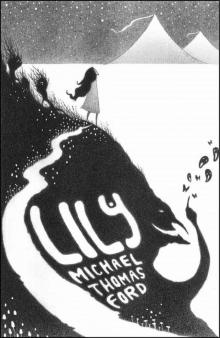 Lily
Lily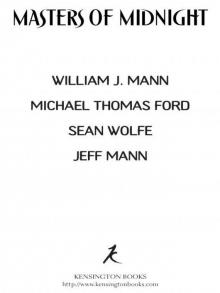 Masters of Midnight: Erotic Tales of the Vampire
Masters of Midnight: Erotic Tales of the Vampire The Road Home
The Road Home Midnight Thirsts: Erotic Tales of the Vampire
Midnight Thirsts: Erotic Tales of the Vampire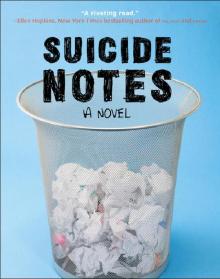 Suicide Notes
Suicide Notes Jane Goes Batty jb-2
Jane Goes Batty jb-2 Jane Vows Vengeance jb-3
Jane Vows Vengeance jb-3 Jane Fairfax 3 - Jane Vows Vengeance
Jane Fairfax 3 - Jane Vows Vengeance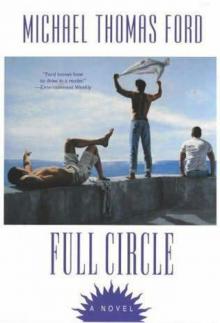 Michael Thomas Ford - Full Circle
Michael Thomas Ford - Full Circle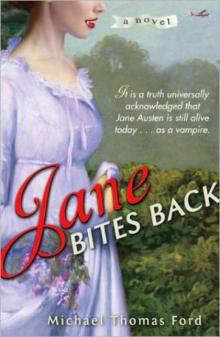 Jane Bites Back jb-1
Jane Bites Back jb-1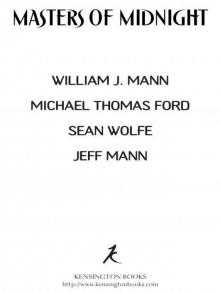 Masters of Midnight
Masters of Midnight